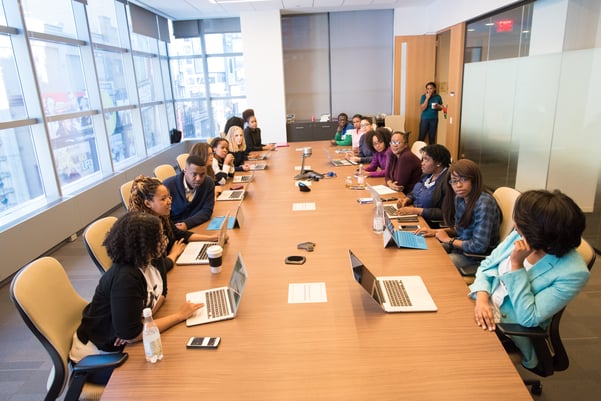The Value of Mentoring Women in the Workplace
In recognition of Women's History Month, evolvedMD's leadership team provide heartfelt anecdotes and words of advice regarding women seeking...
The importance of women in American workplaces cannot be understated; the introduction of females in the workforce has been a major driver of American dominance and prosperity since the Industrial Revolution, through World War 2, and all the way to 2022 and beyond. Despite landmark progress in inclusion and support of women in work, a growing amount of evidence suggests that corporate America, whether intentional or not, is holding women back from reaching their full potential.
This is even more apparent in McKinsey & Company’s recently published Women in the Workplace 2021 report, the largest study on the state of women in corporate America.
evolvedMD knows that the future is female, especially given that our industry (behavioral health and social services) attracts more women than men. As an organization with an overwhelmingly majority-female roster, we understand how important the women of evolvedMD (as well as our partners) are to leading innovation to ultimately reimagine behavioral health in modern primary care.
2021’s McKinsey report is as shocking as it is dense, unnerving as it is comprehensive, and with so many surprising findings and insights, evolvedMD wanted to take the opportunity to highlight reactions to the data from the women directly impacted by the results.
Below you will find data points pulled from the Women in the Workplace report with commentary from the women on our team. In recognition of Women's History Month, we hope all leadership teams and key decision-makers glean critical insights below to ensure we're building the most dynamic, impactful workforce possible.

Sarah Hanchett, LCSW, Director of Clinical Services: “These stats really highlight some of the reasons that women are great leaders and managers of people. The level of support to teams and the promotion of employee well-being can be critical to success.”
Kim Ho, Director of Sales: “It’s reaffirming to see the women as leaders’ stats, particularly the one about senior-level women being twice as likely as senior-level men to spend substantial time on DEI efforts, more likely to be allies to women of color, and to promote employee wellbeing.”

Sarah Hanchett, LCSW, Director of Clinical Services: “It saddens me that women get to the point that they feel the only answer to burnout is to leave the workforce. While this might be the best answer for some individuals, I would love to see more companies have real discussions about well-being, professional growth and promote true work/life balance. At evolvedMD, we have worked to incorporate these discussions into quarterly check-ins with our Behavioral Health Managers. This has helped us keep self-care and wellness at the forefront for our employees.”
Dr. Ruth Nutting, Director of Clinical Programs: “Women, within the workplace, are experiencing increased symptoms of burnout in 2021 compared to 2020 as the current lack of a vibrant workforce is imposing increasingly more demands on them.”
“As lock-down measures have changed—schools have reopened, childcare is more accessible, women have experienced decreasing burden in fulfilling additional roles of educating and providing daily care to their children. Now, women are better able to fulfill their professional roles wholeheartedly, which is leading to the decreasing trend in the consideration of downshifting their careers.”
Jaye Williams, Director of Operations: The prevalence of burnout, especially among women, has increased dramatically since the pandemic began. One of the largest contributors to this increase has been among mothers, “The pandemic has both laid bare the disproportionate burdens many women shoulder in caring for children or aging parents and highlighted the vital roles that have long played in America’s labor force.” (https://apnews.com/article/coronavirus-pandemic-business-lifestyle-health-careers-075d3b0ab89baffc5e2b9a80e11dcf34) As a mother to two young children, I’ve seen the struggle personally. With virtual schooling, school closures, exposure incidents, sick children, etc. the burden to be everything to everyone at home is something I have felt strongly. I am grateful to be here at evolvedMD where burnout is a continual discussion, where we are truly walking the walk. Creating environments that see a person as an individual with a personal life, not just a career, will be monumental for businesses as they seek to recover from the pandemic workforce shift, and bring more women back into the workforce.

Sarah Hanchett, LCSW, Director of Clinical Services: “While our Leadership Team does not reflect these statistics, clearly there is so much work to be done. Both women and men in leadership positions, across all disciplines, need to be actively mentoring more women and especially women of color, to help develop our future leaders.”
Kim Ho, Director of Sales: “The latter two statistics were pretty alarming. What and where can we help to turn the tide in facilitating more opportunities so that drop off doesn’t occur, individually and organizationally?”

Doris Huang, Director of Customer Success: When I was interviewing with evolvedMD, one fact that struck me is that I would be the third Asian woman on the company’s Leadership Team, which is extraordinary in two ways: one, because Asian women are so underrepresented in senior leadership (as the McKinsey report has found), and two, because unlike other geographic markets where I’ve worked previously (like Silicon Valley and New York City), Asians make up quite a small percentage of the overall population in the Phoenix metro area, where evolvedMD is based. None of this escaped my notice; in fact, it signaled to me that evolvedMD is serious about diversity in its employees and in its leadership and is truly “walking the talk.”
Charlene Wong, Director of People: “As an Asian American woman, I struggled with my identity and place in society. There have been moments when I have felt “too Asian” in America, despite being born here. I was sad and insecure as a child when I was one of only a few Asian-Americans at my school.
At the beginning of the pandemic, I experienced sudden moments of self-consciousness while in public. Our former President called the coronavirus the “Chinese virus”. There is a weariness that sets in when you walk out your door, a sense of being watched and scrutinized, and mistrusted.
My advice in response to racism is to build your identity and awareness of what it means to be yourself. For me, that means building community, self-compassion, and mindfulness. There is no right or wrong way to respond in the moment; it is very subjective. But the more you are centered in your own sense of self, the stronger you will feel, and the quicker your recovery.”

Lydia Jones, LCSW, Training Manager: “I unfortunately have witnessed family members experience the overwhelming stress of being on “double duty” – or what I would personally call, “triple duty”, if we add balancing work stress to that list. Being cornered into a position of having to consider downshifting or leaving the workforce to care for family members, while probably adding financial stress as a result, makes me wonder how employers could be more supportive of similar situations. While I have witnessed and heard many of these stories play out within my extended family and friends, I am thankful to not have that experience myself. I feel fortunate enough to work for a company that I know would be supportive and flexible if I found myself in that situation. I’ve been with evolvedMD for 3.5 years not only because I believe in our mission and purpose, but also due to the emphasis we place on employees’ wellbeing.”

Dr. Christina Abby, DSW, LMSW, Clinical Programs Manager: “The statistics in the article are devastating. Unfortunately, they came as no surprise to me. As an African American woman, I have been on the receiving end of many microaggressions, as well as other forms of discrimination. The allyship gap is definitely one that needs to be filled. Being an “only” is a concept that I can also identify with. It often caused me to become the strong, silent type and let my work speak for itself so that I wouldn’t be perceived in the stereotypical ways such as being a “know it all”, “too aggressive”, or “difficult to get along with”, etc. The damaging part to that is that it causes you to be overlooked or ignored when attempting to actually make significant contributions to the team. I was able to find my voice after being encouraged by a mentor to unapologetically be who I am and to go after what I deserve. Her exact words are some that I’ll never forget:
“Dr. Christina, don’t settle. Ask for what you want and don’t be ashamed to do so. YOU won’t change, but people’s perception of you will. And that’s perfectly fine.”
Developing evolvedMD’s DEI initiatives have been helpful with being able to identify ways to accurately identify and address issues surrounding DEI. Having the authority to be one of the champions for DEI in this work environment gives me a sense of comfort in knowing that I am heard and seen and knowing that others are interested in making this work environment inclusive not just for women or women of color, but inclusive of all people. I can honestly say that this is the first time (in a work environment) that I’ve been asked about what I feel I deserve and given it without any hesitation.”
Dr. Ruth Nutting, Director of Clinical Programs: “Within the workplace, there should be zero tolerance for microaggressions toward any woman. It is unacceptable that black women are three to four times more likely to experience disrespect than white women. There needs to be systemic change in which all women, regardless of race, ethnicity, sexual orientation, or religion are accepted, appreciated, and valued.”
The workplace must collaborate in initiatives that create, promote, and advance DEI. The work of DEI should not fully fall within minority populations”.
Study’s Findings:
.jpg?width=600&name=cdc-hqaeIsK3S2w-unsplash%20(1).jpg)
Dr. Ruth Nutting, Director of Clinical Programs: “Executive leaders must demonstrate compassion, understanding, and respect for all women regardless of disability. We must seek to look beyond the disability, to the inner strength, intelligence, and expertise within these individuals”.

Dr. Ruth Nutting, Director of Clinical Programs: “The workplace must be a safe environment for women of all sexual orientations to freely speak about their personal lives, share work/life challenges, and discuss their experience of work-related burnout. Without open and honest discussion with all women within the workplace, companies run the risk of overlooking needed targets of intervention and heighten the potential for increased attrition rates.”

Sarah Hanchett, LCSW, Director of Clinical Services: “We must do more than just say the right things, use the right buzz words and “talk the talk”. Engaging in “proactive, sustained steps” is not easy but is necessary. Our workplaces must be safe places for all.”

Doris Huang, Director of Customer Success: “The question of how to balance work with family and personal life, particularly in light of hybrid and remote work models coming out of the pandemic, is certainly not the exclusive province of women. In fact, in order to achieve true equity in the workplace, it’s imperative that employers work with men and women alike to accommodate family and personal demands alongside professional demands. With that being said, employers should be sure to consult women when designing flexible work policies, as women still play predominant roles in caregiving responsibilities at home, and women also commit a great deal of energy and time to figuring out how to juggle multiple priorities all at once. The challenge is ensuring that in managing all these priorities, women (and men) don’t overlook the importance of taking time for self-care as well. That’s a key tenet of employee wellness at evolvedMD—we even predicate employee bonuses on meeting or exceeding self-care goals.”
Dr. Ruth Nutting, Director of Clinical Programs: “Companies need to continuously remind all employees, this includes executive leadership, about healthy work-related boundaries. There are benefits to flexible scheduling, but employers need to continuously give permission to employees to maintain structure regarding work-related activities that often fall out of “working hours”—this can include projects, assignments, and of course email.”
At evolvedMD, we believe our diverse team is vital to our ongoing success. A market leader in behavioral health integration, we have built an inclusive group of committed changemakers who bring experience from differing and dynamic backgrounds to achieve our audacious ambition.
For us, elevating diverse voices, especially voices of women, is not just talk – its engrained in our culture. With majority female management and leadership teams, each outstanding woman has made a monumental impact on our business in their respective roles and will continue to serve as invaluable resources as we rapidly expand our footprint nationwide.
With this piece, evolvedMD wanted to declare to all women: we stand by you and celebrate your numerous contributions to the workplace and beyond. We’re hopeful that by being proactive and taking the necessary actions, some of which are outlined in McKinsey & Company’s report, companies can help create a more diverse, inclusive, and dynamic workforce.
If you wish to participate in the 2022 Women in the Workplace study, you can sign up at womenintheworkplace.com.
In recognition of Women's History Month, evolvedMD's leadership team provide heartfelt anecdotes and words of advice regarding women seeking...
In collaboration with CFHA, evolvedMD's Erik Osland and Dr. Ruth Nutting shared critical insights into improving workplace well-being for healthcare...
Meet evolvedMD's dynamic, compassionate, and diverse leadership team!